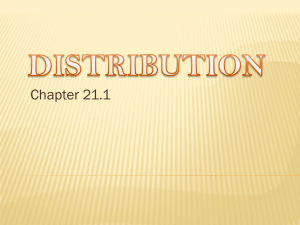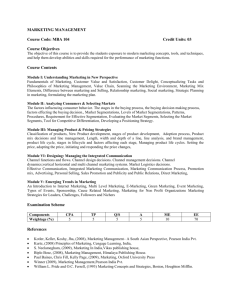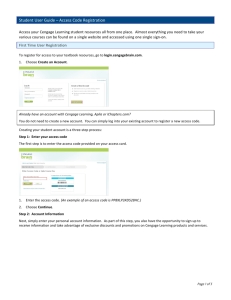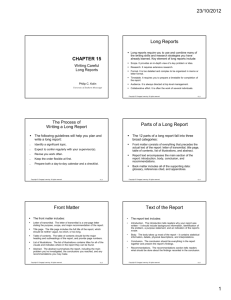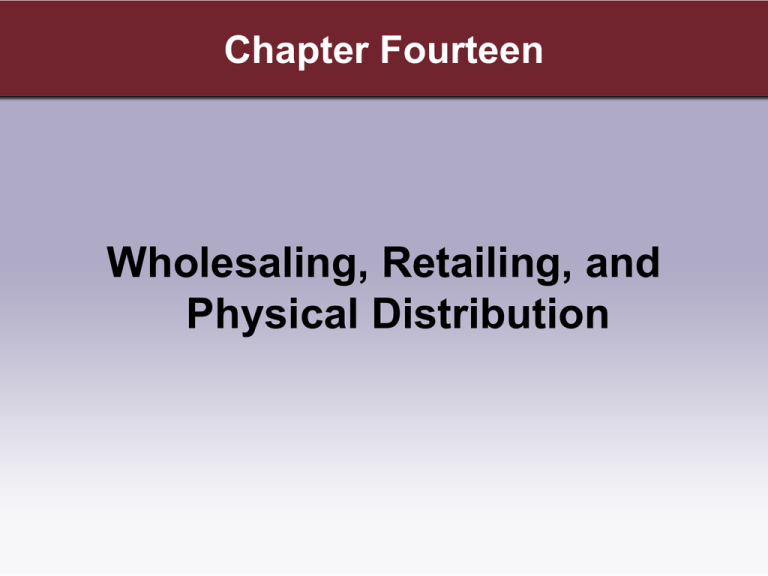
Chapter Fourteen
Wholesaling, Retailing, and
Physical Distribution
Learning Objectives
1. Identify the various channels of distribution
that are used for consumer and industrial
products.
2. Explain the concept of market coverage.
3. Understand how supply-chain management
facilitates partnering among channel members.
4. Describe what a vertical marketing system is
and identify the types of vertical marketing
systems.
5. Discuss the need for wholesalers and describe
the services they provide to retailers and
manufacturers.
Copyright © Cengage Learning. All rights reserved.
14 | 2
Learning Objectives (cont’d)
6. Identify and describe the major types of
wholesalers.
7. Distinguish among the major types of
retailers.
8. Identify the categories of shopping centers
and the factors that determine how shopping
centers are classified.
9. Explain the five most important physical
distribution activities.
Copyright © Cengage Learning. All rights reserved.
14 | 3
Chapter 14 Outline
– Channels of Distribution
•
•
•
•
•
Channels for Consumer Products
Channels for Business Products
Market Coverage
Partnering Through Supply-Chain Management
Vertical Marketing Systems
– Marketing Intermediaries: Wholesalers
•
•
•
•
Justifications for Marketing Intermediaries
Wholesalers’ Services to Retailers
Wholesalers’ Services to Manufacturers
Types of Wholesalers
Copyright © Cengage Learning. All rights reserved.
14 | 4
Chapter 14 Outline (cont’d)
– Marketing Intermediaries: Retailers
• Classes of In-Store Retailers
• Kinds of Nonstore Retailing
– Planned Shopping Centers
•
•
•
•
Lifestyle Shopping Centers
Neighborhood Shopping Centers
Community Shopping Centers
Regional Shopping Centers
Copyright © Cengage Learning. All rights reserved.
14 | 5
Chapter 14 Outline (cont’d)
– Physical Distribution
•
•
•
•
•
Inventory Management
Order Processing
Warehousing
Materials Handling
Transportation
Copyright © Cengage Learning. All rights reserved.
14 | 6
Channels of Distribution
• Channel of distribution (marketing channel)
• Middleman (marketing intermediary)
– A marketing organization that links a producer
and user within a marketing channel
•
•
•
•
Merchant middleman
Functional middleman
Retailer
Wholesaler
Copyright © Cengage Learning. All rights reserved.
14 | 7
Channels for Consumer Products
• Producer to consumer (direct channel)
– No intermediaries
– Used by all services and by a few consumer
goods
– Producers can control quality and price, do not
have to pay for intermediaries, and can be
close to their customers
– Examples: Dell Computer, Mary Kay
Cosmetics
Copyright © Cengage Learning. All rights reserved.
14 | 8
Channels for Consumer Products (cont’d)
• Producer to retailer to consumer
– Producers sell directly to retailers when
retailers (Wal-Mart) can buy in large quantities
– Most often used for bulky products for which
additional handling would increase selling
costs, and for perishable or high-fashion
products that must reach consumers quickly
Copyright © Cengage Learning. All rights reserved.
14 | 9
Channels for Consumer Products (cont’d)
• Producer to wholesaler to retailer to
consumer
– The traditional channel
– Used when a producer’s products are carried
by so many retailers that the producer cannot
deal with them all
Copyright © Cengage Learning. All rights reserved.
14 | 10
Channels for Consumer Products (cont’d)
• Producer to agent to wholesaler to retailer to
consumer
– Agent
– Often used for inexpensive, frequently
purchased items, for seasonal products, and
by producers that do not have their own sales
forces
Copyright © Cengage Learning. All rights reserved.
14 | 11
Channels for Consumer Products (cont’d)
• A manufacturer may use multiple channels
– To reach different market segments
– To increase sales or capture a larger
market share
Copyright © Cengage Learning. All rights reserved.
14 | 12
Channels for Business Products
• Producer to business user
– Usually used for heavy machinery, airplanes,
major equipment
– Allows the producer to provide expert and
timely services to customers
Copyright © Cengage Learning. All rights reserved.
14 | 13
Channels for Business Products (cont’d)
• Producer to agent middleman to business
user
– Usually used for operating supplies, accessory
equipment, small tools, standardized parts
Copyright © Cengage Learning. All rights reserved.
14 | 14
Market Coverage
• Intensity of market coverage
– Intensive distribution
– Selective distribution
– Exclusive distribution
Copyright © Cengage Learning. All rights reserved.
14 | 15
Partnering Through Supply
Chain Management
• Supply chain management
– Long-term partnership among channel members
– Category management
– Technology
Copyright © Cengage Learning. All rights reserved.
14 | 16
Vertical Marketing Systems
• Vertical channel integration
– The combining of two or more stages of a
distribution channel under a single firm’s
management
• Vertical marketing system (VMS)
– A centrally managed distribution channel
resulting from vertical channel integration
– Administered
– Contractual
– Corporate
Copyright © Cengage Learning. All rights reserved.
14 | 17
Marketing Intermediaries: Wholesalers
• Justifications for marketing intermediaries
– Intermediaries perform essential marketing
services
– Manufacturers would be burdened with additional
record keeping and maintaining contact with
numerous retailers
– Costs for distribution would not decrease and
could possibly increase due to the marketing
inefficiencies of producers
Copyright © Cengage Learning. All rights reserved.
14 | 18
Wholesalers’ Services to Retailers
• Buy in large quantities and then sell in smaller
quantities
• Deliver goods
• Stock in one place a variety of goods
• Promote products to retailers
• Provide market information for both producers
and retailers
• Provide financial aid in the form of inventory
management, loans, delayed billing
Copyright © Cengage Learning. All rights reserved.
14 | 19
Wholesalers’ Services to Manufacturers
• Provide instant sales forces to manufacturers
• Reduce manufacturers’ inventory costs by
purchasing finished goods in sizable
quantities
• Assume the credit risks associated with
selling to retailers
• Furnish market information gleaned from the
market and customers to the manufacturers
Copyright © Cengage Learning. All rights reserved.
14 | 20
Types of Wholesalers
• Merchant wholesalers
– Operate in one or more warehouses where they
receive, take title to, and store goods
– These wholesalers are sometimes called distributors or
jobbers
– Full-service wholesalers
• General merchandise wholesaler
• Limited-line wholesaler
• Specialty-line wholesaler
– Limited-service wholesalers
Copyright © Cengage Learning. All rights reserved.
14 | 21
Types of Wholesalers (cont’d)
• Commission merchants, agents, and brokers
– Functional middlemen that do not take title to
products
– Perform some marketing activities
– Paid a commission (percentage of sales price)
– Commission merchant
– Agent
– Broker
Copyright © Cengage Learning. All rights reserved.
14 | 22
Types of Wholesalers (cont’d)
• Manufacturer’s sales branch
– Merchant wholesaler owned by a
manufacturer
– Carries inventory, extends credit, delivers
goods, helps in promoting products
– Customers are retailers, other wholesalers,
and industrial purchasers
• Manufacturer’s sales office
– Sales agent owned by a manufacturer
– Sells goods manufactured by its own firm and
also others that complement its own product
line
Copyright © Cengage Learning. All rights reserved.
14 | 23
Marketing Intermediaries: Retailers
• Retailers: The final link between
producers and consumers
• Approx. 2.6 million retail firms in the U.S.
• 90% have sales of less than $1 million
Copyright © Cengage Learning. All rights reserved.
14 | 24
Classes of In-Store Retailers
• Independent retailer
• Chain retailer
• Department store
• Discount store
Copyright © Cengage Learning. All rights reserved.
14 | 25
Classes of In-Store
Retailers (cont’d)
• Catalog showroom
• Warehouse showroom
• Convenience store
Copyright © Cengage Learning. All rights reserved.
14 | 26
Classes of In-Store
Retailers (cont’d)
• Supermarket
• Superstore
• Warehouse club
Copyright © Cengage Learning. All rights reserved.
14 | 27
Classes of In-Store
Retailers (cont’d)
• Traditional specialty store
• Off-price retailer
• Category killer
Copyright © Cengage Learning. All rights reserved.
14 | 28
Kinds of Nonstore Retailing
• A type of retailing whereby consumers purchase
products without visiting a store
• Direct selling
• Direct marketing
Copyright © Cengage Learning. All rights reserved.
14 | 29
Kinds of Nonstore Retailing (cont’d)
• Catalog marketing
• Direct-response marketing
• Telemarketing
Copyright © Cengage Learning. All rights reserved.
14 | 30
Kinds of Nonstore Retailing (cont’d)
• Television home shopping
• Online retailing
• Automatic vending
Copyright © Cengage Learning. All rights reserved.
14 | 31
Planned Shopping Centers
• A self-contained retail facility constructed by
independent owners and consisting of various
stores
– Lifestyle shopping center
– Neighborhood shopping center
– Community shopping center
– Regional shopping center
Copyright © Cengage Learning. All rights reserved.
14 | 32
Physical Distribution
• All those activities concerned with the efficient
movement of products from the producer to the
ultimate user
• Inventory management
– The process of managing inventories in such a way as
to minimize inventory costs, including both holding
costs and potential stock-out costs
• Holding costs
• Stock-out
• Order processing
– Activities involved in receiving and filling customers’
purchase orders
Copyright © Cengage Learning. All rights reserved.
14 | 33
Physical Distribution
• Warehousing
– The set of activities involved in receiving and storing
goods and preparing them for reshipment
•
•
•
•
•
•
•
Receiving goods
Identifying goods
Sorting goods
Dispatching goods to storage
Holding goods
Recalling, picking, and assembling goods
Dispatching shipments
– Types of warehouses
• Private warehouses
• Public warehouses
Copyright © Cengage Learning. All rights reserved.
14 | 34
Physical Distribution (cont’d)
• Materials handling
• Transportation
– The shipment of products to customers
– Carrier
• Common carriers
• Contract
• Private carriers
– Freight forwarders
– Railroads
Copyright © Cengage Learning. All rights reserved.
14 | 35

